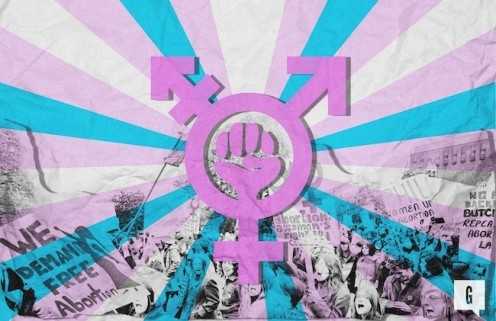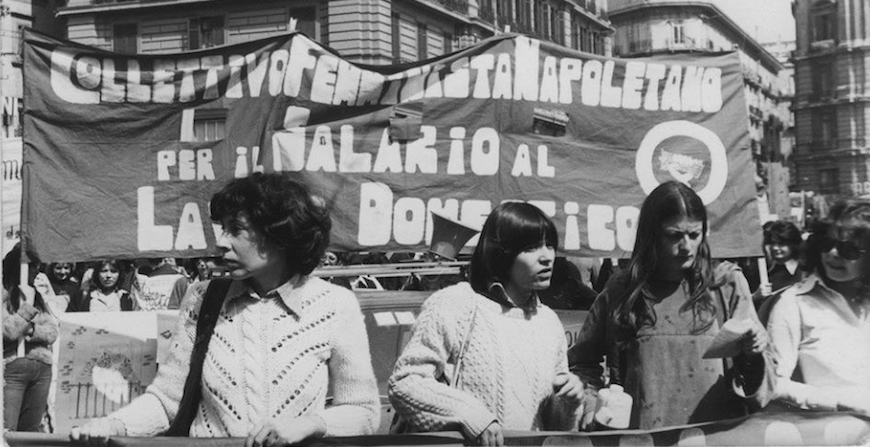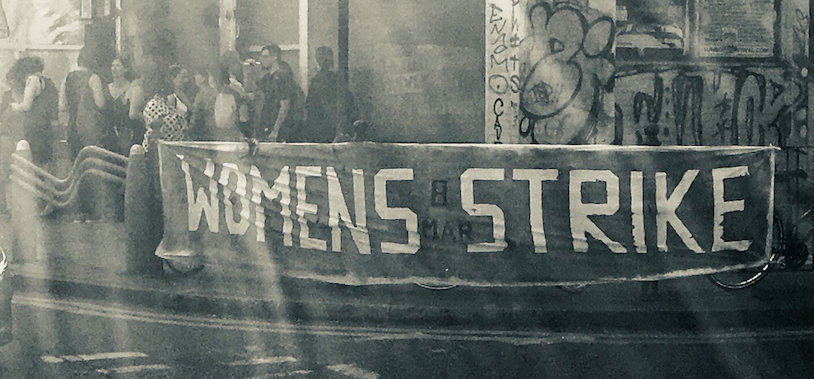The Morning Star recently published two articles in which the authors argued that trans people should not be included in feminist movements and analysis. The articles, by self-described ‘radical feminists’ Jennifer Duncan and Rebecca Reilly-Cooper, were written in a tone of righteous disapproval of the way in which recent movements have moved away from second-wave feminist analysis to a more nuanced way of understanding gender identity.
For many this is simply an irksome debate; some believe that trans people should be able to participate and figure in gender analysis, others are more ‘traditional’. It’s something that I imagine to be similar to discussions on the left around homosexuality in decades past. Those without a vested interest are given priority over those who are directly affected and materially struggling with the consequences of the ‘debate’. Meanwhile the supposed ‘rights’ of left-wing publications to publish and propagate this view are prioritised far above solidarity and anger from so-called allied comrades. One measure of the success of a liberation movement is to look at how contested the arguments around the oppression are; as we progress many of these ‘debates’ are becoming less and less acceptable –. Indeed for some, the ‘debate’ no longer exists on a wide scale because a new consensus of acceptability (however liberal) of trans existence has been formed. Gay rights have experienced this genesis post-AIDs crisis after an incredibly successful, radical movement that is often overlooked (due, in part, to a large number of these activists dying from AIDs themselves).
A lot of the trepidation around calling these articles ‘oppressive’ (i.e. transphobic) stems from the fact that, as women, the writer are from an oppressed group themselves and are, to some extent, arguing for the liberation of their group. This ‘shooting downwards’ within oppressed groups is not uncommon and, for me, is strongly associated with respectability politics i.e. the exclusion of those at the intersections of oppression, or those who suffer the most from an oppression, in order for those who are deemed ‘more acceptable’ in the eyes of the oppressors to gain privilege for themselves (always at the expense of others). Capitulation to oppressors is a simple and easy way to gain ‘rights’ for the most privileged of an oppressed group, whilst actively barring the way to total liberation. Even by those on the right, women’s rights are largely accepted right as a legitimate issue. Trans rights however, although deeply tied in with women’s rights, are not given the same hearing. Trans people are messy, complicated and outrageous to heteronormative society.
Transphobia stems from patriarchy and heteronormativity, insofar that transness tends to challenge traditional gender roles and norms (sexual and otherwise), which are utilised abundantly within the capitalist system. If we are anti-capitalists, then, we ought to be deeply invested in destroying the tools of oppression and be directly opposed to patriarchal, hetero, capitalist logic. The disturbing thing about Duncan’s article is that her analysis of transgender people argues that we are somehow neo-liberal individualists who are rejecting the struggle rather than engaging with it. This relies upon her argument that the world is divided into two polar opposite ‘sexes’ and that this accounts for all oppression of women. She even goes so far as to describe women’s bodies as inherently weaker and more vulnerable than men’s bodies, suggesting that this is the basis for sexualised violence and rape.
Many radical feminist arguments focus on the logic of bodily weakness, displaying an inherent physical inferiority complex. They rely heavily on a binary of strong vs weak, emotional vs lacking emotion etc. If we want to liberate women, why should we then, rely upon patriarchal ideas that are used to propagate the idea of the inherent inferiority of women as a class? Wendy Brown (a gender theorist and partner to Judith Butler) calls this phenomenon ‘wounded attachment’ – the idea that some feminists focus solely on the physicality and physical attributes and ‘wounds’ of women. This analysis is crushingly limited and sexist. It leads to some ‘sex negative’ feminists, famously the Leeds Revolutionary Feminists pamphlet, to argue for ‘political lesbianism’ in order to avoid oppressive sexual practice. This relies, again, on a deeply violent analysis of sex with the concept of penetration itself coming to stand for domination and even rape. The totality of this logic is crude and does not take into account context, power and nuance. It sees having a penis as in itself a form of power, rather than the power being merely attributed through a patriarchal lens.
We come then to understand the way in which radical feminists argue against the inclusion of trans women in particular. As ‘people born with penis’ they have inherently oppressive bodies, an immutable fact that cannot be overcome by any means. When one offers a totally binary logic there is no possible way to transgress these boundaries. They are fixed. Thus, a trans women is never a women and only pretends to be. Trans men are, in effect, misguided class traitors and non-binary people ridiculous and pretentious. This analysis rests entirely on biological essentialism and determinism. Faced with such logic, then, the only way forward is to try to alter the scope of gendered roles whilst ultimately believing gendered characteristics to be inherent – a self-defeating and rather obtuse task.
It is obvious to many of us that there are a wide variety of factors, very much aside from ‘biology’, which oppress women as a class. Our society is, more often than not, working on an assumption of certain biology rather than knowing for certain what genital configuration its subjects actually have. Gender is associated with certain biological make-up but that is only ever a secondary assumption to the initial perception of gender. A simple example might be job applications: a candidate with a feminine name is automatically assumed to be female and is accordingly treated as such and discriminated against compared to a similar candidate with a masculine name. Here it can only be social cues which cause discrimination as the candidates have not yet been seen bodily. More broadly, we must see gender as a societal phenomenon which attempts to classify people into one of two categories, thus deciding their relative privilege or oppression.
Gender as performance is a popular concept in trans discourse. This concept argues that we are all ‘performing’ a societal role which has been codified in a series of complex actions, presentations and preferences. These ‘codes’ are almost entirely socially constructed. In capitalist society the norms have been structured and centred around the exploitation of women as a class which will reproduce the workforce; biologically, socially and emotionally. This is done not only through childbirth itself but through unpaid social reproductive labour (cooking, cleaning, care) and emotional labour which ties the family unit together. We can see that not all of this labour relies entirely on anatomy, nor does it need to be particularly tied to one sex. It could just as easily be done by men and yet due to patriarchal structures and culture, it often isn’t.
The need for social reproduction is recognised as a necessity by the ruling class . It has thus cleverly exploited a category which constitutes more than half the workforce, forcing them in both overt and subtle ways to take this work on (mostly) willingly. Feminised people are also relegated to part-time, precarious work and lack of job security based on the assumption that they will give up paid work, at least for a time, during childbirth and child-rearing regardless of whether or not they plan to have children. In this way, trans women are categorically similar to cis women who choose not to have children or are infertile, particularly if the trans woman is not known or assumed to be trans in the workplace.
Here we see a much more subtle, nuanced and pervasive way in which women and feminised people are oppressed on the basis of their gender. We can see non-binary identities as an attempt to destabilise these categories, in turn destabilising capitalistic and patriarchal attempts to divide and oppress the workforce via gendered roles. If we question the categories of gender we are also fundamentally questioning the artificial superiority given to men and masculinity – calling it out as constructed fallacy and recognising our capacity to refute this.
A common argument, used by Reilly-Cooper is; the ‘problem’ of loosened gender categories means people ‘get to’ define themselves however they want. Far from being the actual case, it is nevertheless interesting to note that this idea is seen to be negative. Within the logic described earlier, of absolute and crude attachment to ‘biology’, these categories are essential in order maintain a certain type of analysis and view of women’s oppression as stemming from the ‘wounded’ body. It becomes extremely important to maintain strong gender categories in order to exclude and ‘protect’ the movement. Yet as I have argued, these categories are themselves constructed to oppress us. Their destruction is not only desirable but absolutely necessary. This does not by any means, suggest we ignore or devalue them, rather we should be understanding, challenging and breaking them down as barriers through a collective process within the movement.
Thus, far from being individualistic, the trans struggle is the struggle against patriarchy, heteronormativity and capitalism. Though neo-liberalism attempts to individuate and contain trans narratives as mere personal journeys of ‘self-discovery’ it should be easy for us to see this as a tactic to diminish the radical possibilities of transness and a trans-inclusive movement. It is abundantly clear that the neoliberal logic of liberation co-opts struggles by lauding individuals and leaders over the collective and by mocking us with special days, events and faux-inclusive policy. It should, then, be just as obvious that as the trans movement gains popularity, the same tactics will be utilised!
Trans liberation and trans inclusion are absolutely necessary if we want to effectively challenge the patriarchy and build a feminist movement capable of fully refuting patriarchal and capitalistic logic. For me, this is not a matter for idle debate nor a frivolous scandal from a left-aligned newspaper. Transphobia on the left is alive and well and ought to be treated with due seriousness. This is not a mere difference of opinion but constitutes an oppressive act borne out of essentialist logic underpinned by patriarchal assumptions about bodily weakness. These areguments have no place in our struggle for freedom from oppression. I expect full solidarity from any communist or anarchist worth their salt in this debate; there is a lot at stake, as it is not only important for trans people but also for feminism and gendered liberation in general.
By Dylan Dunnett





